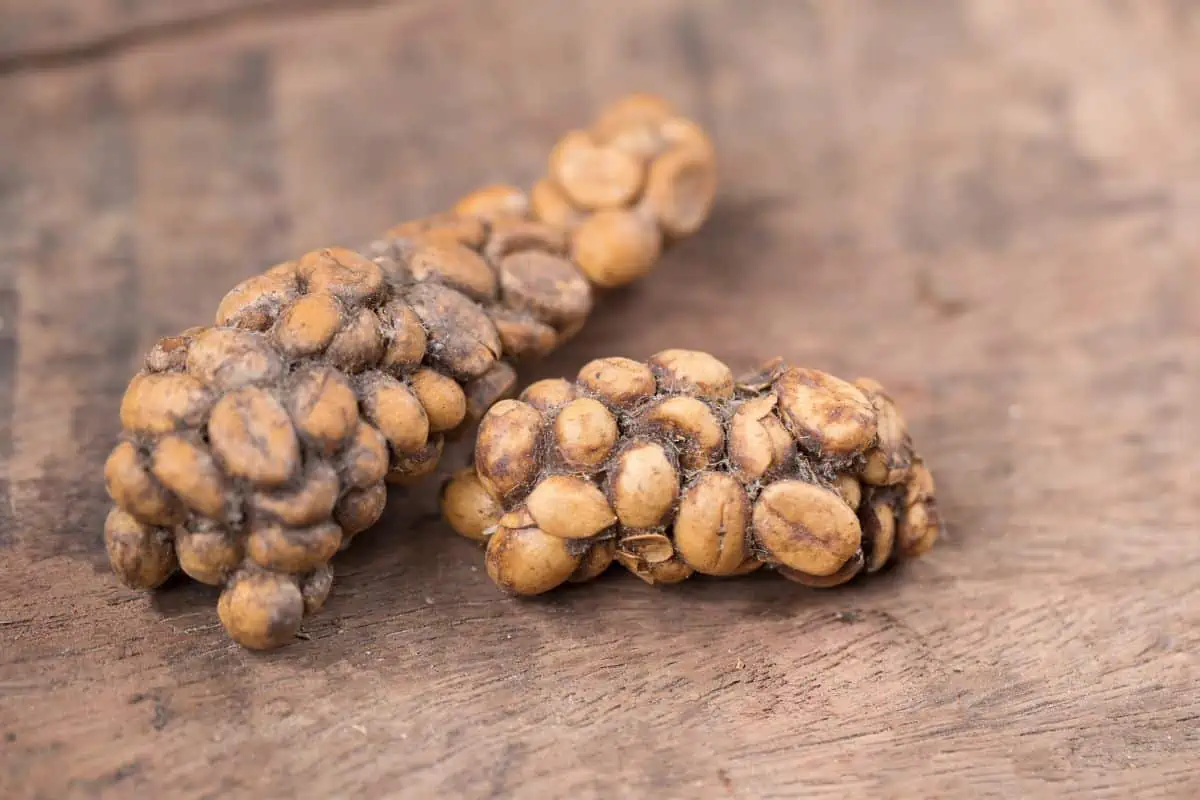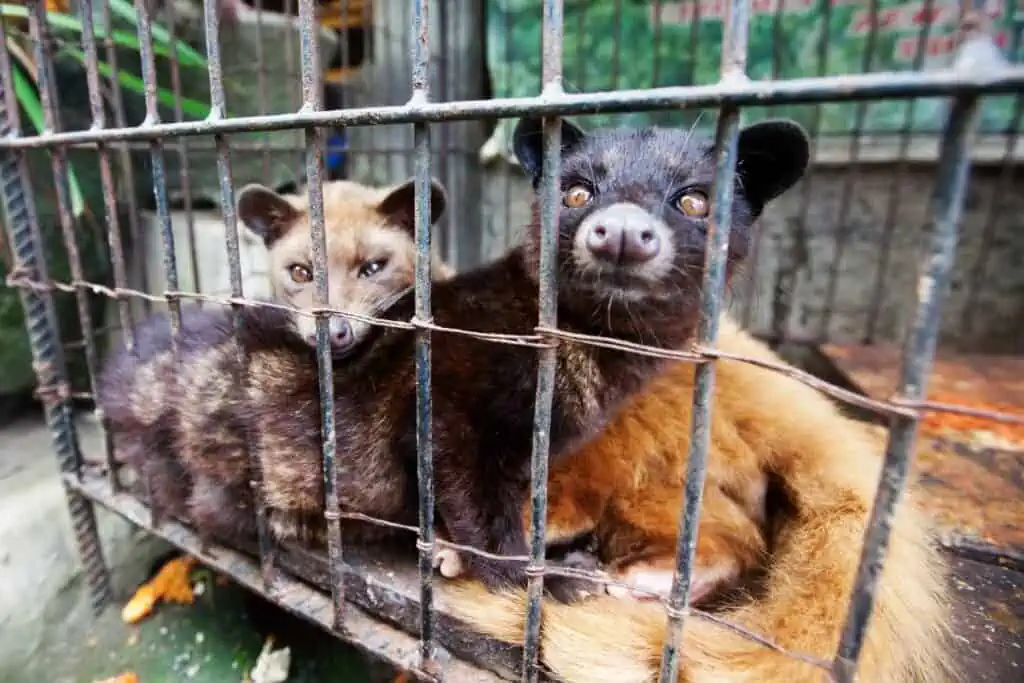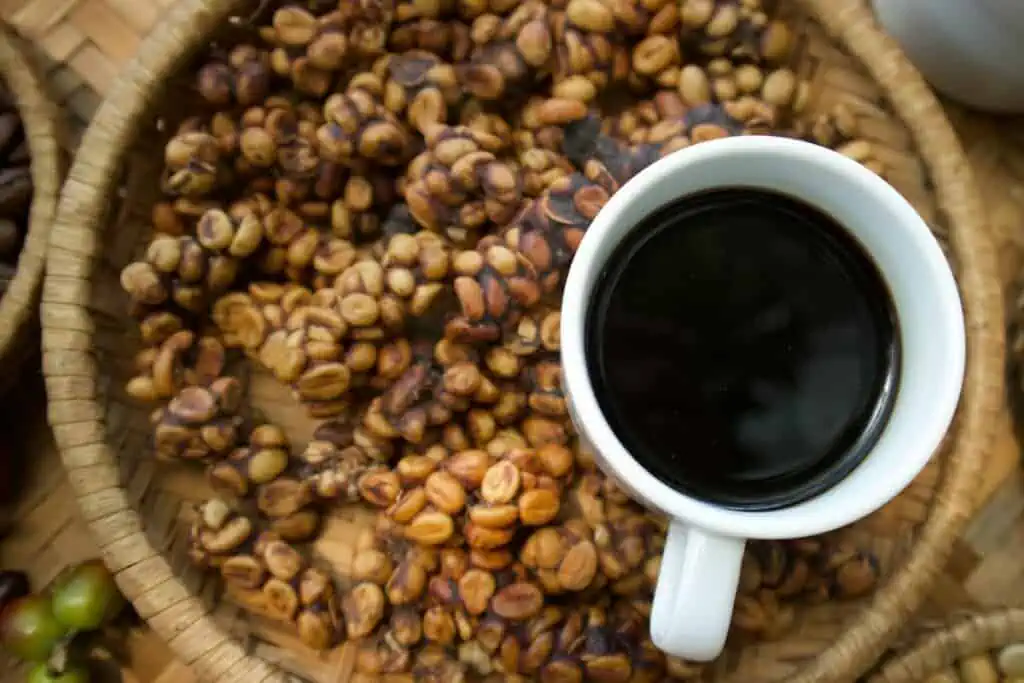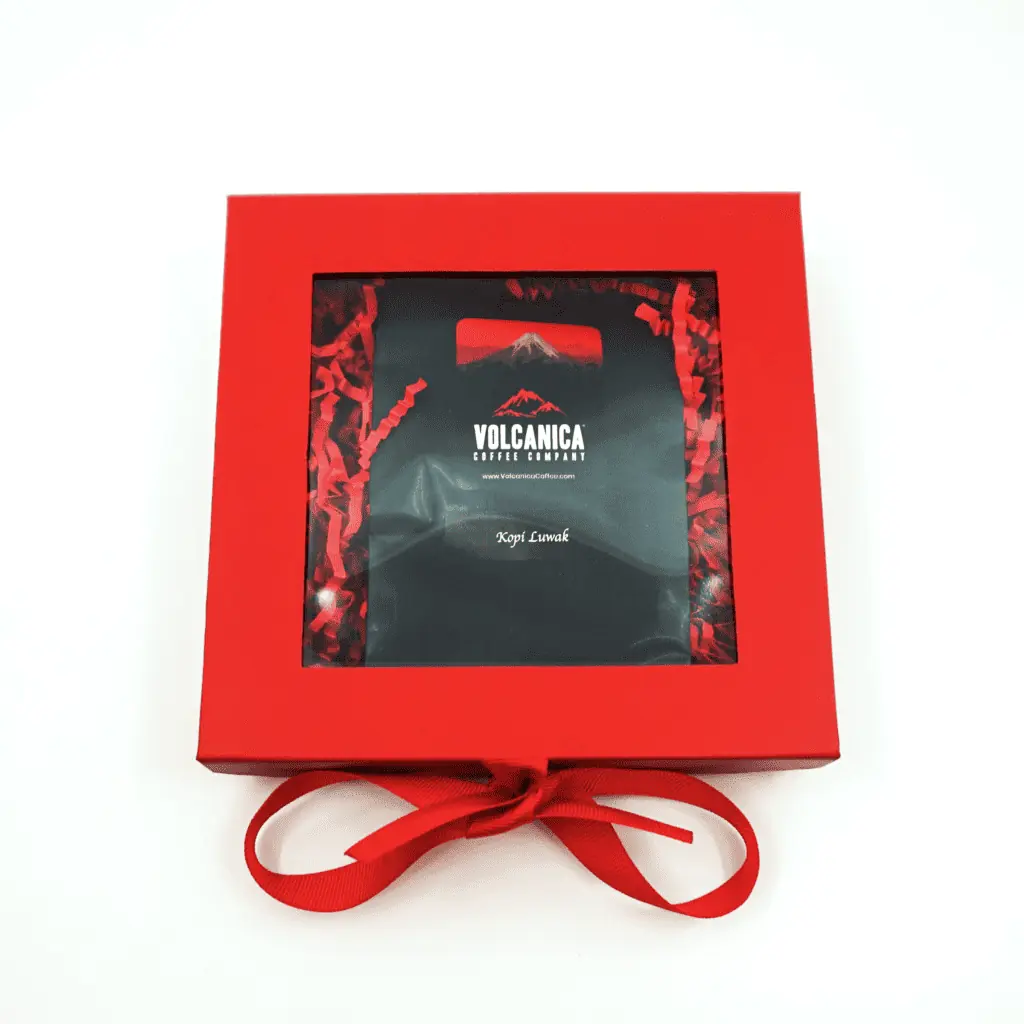So, you’ve stumbled upon the intriguing world of Kopi Luwak coffee which is also known as Cat Poop Coffee and Civet Coffee, as you will find out. Known as one of the world’s finest and most unique luxury coffees, Kopi Luwak is not your average morning brew.
Why is it so special, you ask? It all starts with the Asian Palm Civet, a feline-like creature native to the Indonesian islands. These adorable creatures have an impeccable taste for coffee cherries and, as luck would have it, also possess a digestive process that transforms the beans into the most expensive coffee in the world.
Once the civets have “processed” the cherries, diligent collectors gather the civet poop, then clean and roast the beans to create the one-and-only Kopi Luwak coffee, aka cat poop coffee.
Now I have had plenty of coffee that tasted more like cat pee than coffee in my time but not that tasted like cat poop. Let’s find out what the fuss is all about.

The Curious Origin of Kopi Luwak
A Unique Collaboration Between Animals and Humans
Imagine yourself as a farmer in central Java back in the 19th century. You worked tirelessly on your coffee plantation but the Dutch colonialists, who introduced the Arabica coffee plant to Indonesia, forbid you from even sampling a cup of your own brew.
This must have been quite frustrating. However, something peculiar happened – a unique collaboration between animals and humans led to the creation of a coffee unlike any other.
Nature played its hand with the intervention of the Asian palm civet, a cat-like creature roaming in the forests of Indonesia. The civet, also known as a luwak, is particularly fond of coffee cherries.
It would eat the cherries, ferment the coffee beans in its digestive system and eventually excrete them. Farmers like yourself soon realized that these beans could be used to make an exceptional cup of coffee. And thus, Kopi Luwak was born.
The Peculiar Role of Civet Cats

There’s something a bit outlandish about the idea of producing coffee from beans plucked from the feces of a wild animal. But the civet cat’s peculiar digestive process is precisely what sets Kopi Luwak apart.
It is said that the digestive enzymes and fermentation process within the civet cat’s digestive system help break down the beans’ proteins and enhance their overall flavor.
As you’re taking a sip of this unusual brew, you may wonder how the humble, poo-sifting farmers went about collecting the beans. They would patrol their plantations, searching for the civet cat droppings containing the precious beans.
After collecting the beans, they would clean, dry, and roast them, creating the surprisingly luxurious and smooth coffee known as Kopi Luwak (but known by others who are more colorful as cat shit coffee).
Luxury at a Price: The Ethics of Kopi Luwak
So, you’re a coffee lover, huh? Well then, let’s discuss the (in)famous Kopi Luwak. With a price tag of up to $100 per cup for wild civet coffee, it’s praised as one of the most luxurious and expensive coffees in the world.
But what’s behind this lavish reputation? And can you sip it with a clear conscience? Buckle up as we delve into the ethics of this extravagant java.
Civet Cat Welfare and Farming Concerns

First and foremost, let’s discuss the cute little critters behind this coffee: the Asian Palm Civets.
Kopi Luwak originates from their digestive process. That’s right; it’s made from civet poop! But don’t cringe yet. The civets feast on the choicest coffee cherries, and their enzymatic “processing” is said to enhance the flavor of the beans. A tasty arrangement, right?
However, the demand for Kopi Luwak has led to some less-than-ideal living conditions for these animals. Many are kept in tiny cages and force-fed a cherry-only diet. Talk about a prisoner’s palate!
Well, no surprises there really – where there is profit to be made there are always greedy people with no conscience ready to exploit animals.
To avoid contributing to civet suffering, look for ethically sourced Kopi Luwak from wild, free-roaming critters. Good beans are a lot like good karma – you get what you give!
The Environmental Impact
But wait, there’s more! Kopi Luwak raises some eco-related eyebrows as well. Intensive farming practices can lead to deforestation and habitat loss, pushing that luxury cup of joe to new ethical lows.
The solution? Get your caffeine fix from environmentally conscious suppliers. Seek out producers who practice sustainable farming methods and support long-term environmental goals. Think of it this way: the greener your beans, the brighter your mornings!
Should Farmed Kopi Luwak be banned?
Yes, in my opinion, it should.
Exploiting these creatures so that morons in the West, with more money than sense, can “enjoy” a cup of rare coffee is not acceptable.
It is just as bad as the disgusting practices to make:
- French Foie gras where geese are force-fed to make their livers enlarge
- Veal where calves are kept in the dark, in crates unable to move to produce whiter meat. Crates are outlawed in the EU but still allowed in the US.
Sadly, profit always seems to come first.
Finding and Buying Authentic Civet Coffee
If you are a true coffee connoisseur, when it comes to finding Kopi Luwak coffee for sale for your sophisticated taste buds, navigating the vast coffee world can be both exciting and daunting.
Your first mission is to find the best civet coffee from credible coffee producers. The good news is that many reputable suppliers have emerged in recent years, offering certified wild and ethically sourced beans.
When choosing a supplier, pay attention to certifications and their sourcing process. You should look for those who actively promote ethical practices, ensuring that the beans come from wild civets (cage-free civets), and reducing potential harm and exploitation of these lovely creatures.
Volcanica Coffee deals in 100% wild Kopi Luwak coffee in Indonesia. They can supply a Kopi Luwak Coffee sampler or a 16 oz bag:
Splurge Wisely: Price and Quality Considerations
Now that you’ve found a reputable supplier, let’s discuss the right way to splurge on your exclusive Civet coffee beans. As they say, quality over quantity!
Since Kopi Luwak is known as the world’s most expensive coffee, be prepared to shell out a little more cash for the real deal. A higher price tag often suggests authenticity and the use of sustainable practices in its production.
If you’re hesitant to invest in a full pound of beans while still building your aficionado status, consider starting with smaller quantities such as 50 grams or a 2-ounce sampler. This way, you can indulge without breaking the bank, and acclimate your taste buds to the refined flavors of the legendary Kopi Luwak.
Crafting the Exclusive Brew
When it comes to Kopi Luwak coffee, the exclusivity of the beverage extends beyond its price tag. The entire process of crafting this extraordinary brew, from collection to brewing, has a certain mystique and artistry that you can only truly appreciate once your taste buds experience its delightful flavors.
The Extraordinary Wild Collection Process
Picture this: You’re traversing the lush forests of Southeast Asia, flashlight in hand, on a mission to collect the finest Kopi Luwak beans. Not from the branches of coffee plants, but rather from the feces of a small, furry creature – the Asian palm civet.
The civet, a finicky gourmet of the animal kingdom, feasts on only the ripest, juiciest coffee cherries, delivering a partial fermentation in its digestive system before graciously depositing coffee beans onto the forest floor.
It is regarded as nature’s very own coffee critic, providing you with the crème de la crème of coffee beans, wrapped up in a surprising package.

The Detailed Roasting and Brewing Techniques
Now that you’ve obtained the elusive beans, it’s time to roast and brew them to perfection. Though Kopi Luwak boasts a unique origin story, the roasting and brewing methods employed aren’t too different from conventional coffee. The key, however, is to handle these VIP beans with care and precision.
- Roasting: Gently roast the Kopi Luwak beans just enough to bring out their complex flavors and aromas. Keep a close eye on your precious cargo – overcooking these beans would be a tragedy!
- Brewing: For a lighter, cleaner cup of coffee, a V60 dripper is your go-to brewing method. On the other hand, if you prefer a bolder, oilier brew, a French press is your best friend. Both methods help you uncover the distinct qualities of civet coffee.
There you have it! Armed with these exclusive brewing insights, you’re now ready to fashion the perfect cup of Kopi Luwak and experience the heaven-sent flavors that only civet-selected beans can offer. Cheers to your next luxuriously crafted caffeine fix!
Savoring the Taste: A Flavor Profile
So, you’ve decided to delve into the world of Kopi Luwak coffee (ethically produced I assume).
Well rather you than me but you have probably stopped reading by now anyway since I referred above to those willing to pay up to $100 a cup as morons. I make no apologies for that – it’s my blog.
Distinct Characteristics and Notes
Many people describe it as nutty, rich, and delicious, with hints of caramel and chocolate swirling around in the mix. This remarkable taste results from the fermentation process that takes place inside the civet’s stomach, lending the beans an exclusive flavor not found in your everyday cuppa.
As you savor each sip, you may notice that the coffee has a low acidity, giving it a smooth and balanced taste. The body is heavy, making it a full-bodied beverage that captivates your senses. Just think of your taste buds celebrating this intriguing mix of flavors!
Save It for Special Occasions
Considering its rarity, high price tag, and the somewhat unnerving process in which it’s created, it’s probably best to classify Kopi Luwak as a treat reserved for special occasions.
Your birthday, major life milestones, or for me when hell freezes over! Feel free to indulge in a cup of this exotic coffee on these noteworthy days.
In the meantime, share your newfound coffee knowledge and tasting experiences with your friends. They might find the cat poop coffee story either fascinating or slightly horrifying.
Find out about all the different types of coffee drinks in our complete guide.
Kopi Luwak FAQs
Why is Kopi Luwak coffee so expensive?
Kopi luwak coffee is expensive because the process of producing it ethically is very labor-intensive and time-consuming. The beans must be collected from the forest by hand from the feces of the civet and then thoroughly cleaned and roasted. Additionally, the supply of kopi luwak coffee is limited, as the civets only produce a small amount of beans each year.
Is Kopi Luwak coffee ethical?
Not all Kopi Luwak coffee is ethical. In many countries, civets are kept in cages and force-fed coffee cherries in order to produce more beans. This practice is cruel and inhumane. However, there are some ethical producers of Kopi Luwak coffee who allow the civets to roam freely and only collect beans that have been naturally excreted.
What does Kopi Luwak coffee taste like?
Kopi Luwak coffee has a unique flavor that is described as earthy, nutty, and smooth. Some people also detect hints of chocolate or caramel. The flavor of Kopi Luwak coffee can vary depending on factors such as the type of coffee bean and the roasting process.
Is Kopi Luwak coffee worth the price?
Some people are willing to pay the high price for Kopi Luwak coffee because of its unique flavor and the novelty of trying a rare and exotic coffee. Others may not find the taste to be significantly different from other types of coffee and therefore not worth the expense.
Is Kopi Luwak available in k cups
Kopi Luwak K-cup is a convenient way to experience the rarest and most expensive coffee in the world. This coffee is available in K cups from some coffee suppliers.
Read: Does bulletproof coffee break a fast?
My name is JP and I am an avid coffee lover. Since I began college and realized what a heavy load writing majors took on, I have been a fan of the bean juice.
My job took me all over the US on book tours and press conferences, and my favorite part about the trip was exploring the best places to grab my cup of Joe.







